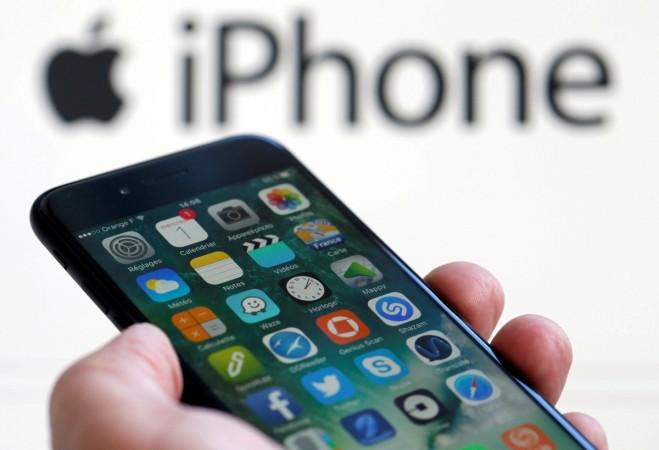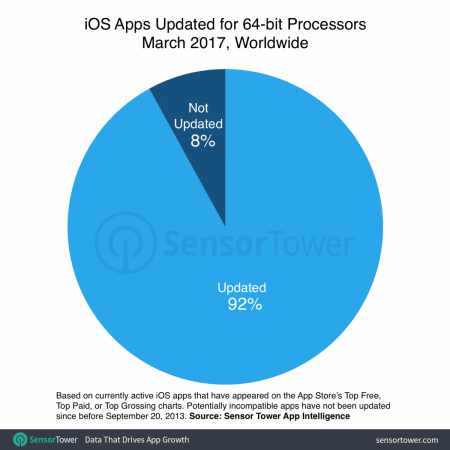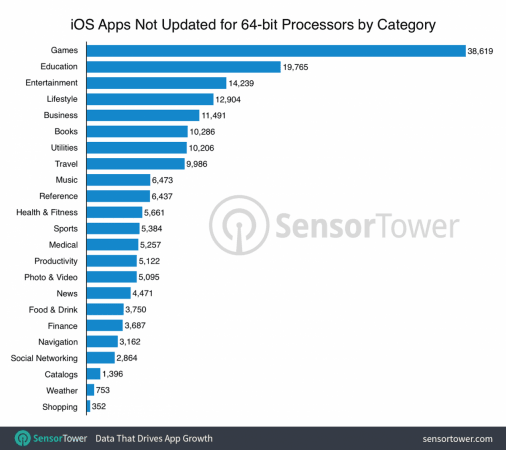
A 64-bit architecture for all iOS apps is inevitable. Apple itself issued a warning in the iOS 10.3 beta saying all 32-bit apps "will not work with future versions of iOS." But when can we expect that to happen?
An analytics firm called Sensor Tower has performed an analysis of currently active apps in the App Store, and has determined that approximately 187,000 32-bit apps could be incompatible with iOS 11, the upcoming version of Apple's mobile operating system.
Although the number represents only about 8 percent of nearly 2.4 million apps available in the company's official app marketplace, the actual figure could potentially be much higher because Sensor Tower's numbers are based on apps that were submitted before the launch of the iPhone 5s – the first iOS device to feature a 64-bit processor – in September 2013.
While Apple had been encouraging developers to update their apps to support the 64-bit processors, Sensor Tower discovered in September last year that about 16 percent of the App Store apps hadn't been updated in more than three years.

A much-needed purge
Apple apparently had it enough, and now it has started forcing developers to get their apps up to scratch. Previously, iOS used to simply warn that 32-bit apps might slow down a device.
The iPhone-maker recently conducted a purge of broken or unsupported apps, and had reportedly removed as many as 47,300 apps from its store in last October. It was in February 2015 when Apple required new apps to offer 64-bit support. The company also said it would reject updates for 32-bit apps from June 2015.
Therefore, if iOS 11 will indeed be 64-bit only, Apple will have to brick all the 32-bit apps once the new iOS version rolls out. And, games being the single largest category of iOS apps worldwide, they lead the pack of potentially affected apps as well.

No, you can't blame Apple for this. In fact, it's a much-needed move to make the App Store a less-crowded space, and enhance the performance of future iOS versions running on new 64-bit devices.
How does the push for 64-bit matter to you?
If you are using older iOS devices built on 32-bit architecture – including the iPhone 5, 5c and older, the standard version of the iPad and the first iPad mini – you will not be able to update the firmware to the new iOS version.
In addition, if you are still using older 32-bit apps on your newer iOS devices, it's time for you to look for a new version. And if it's not there, you can ask the developers to migrate from 32-bit to 64-bit before it's too late.
If you are wondering why the new 64-bit architecture is not cooperative, the answer is quite straight-forward – it's not designed to work that way.
A 32-bit OS can run on both 32-bit and 64-bit processor without any hassle while a 32-bit app runs on a 32-bit or 64-bit OS. However, a 64-bit app runs only on a 64-bit OS, which is compatible only with a 64-bit processor.
Although very likely, Apple embracing 64-bit and ditching 32-bit is still just a speculation. Even if the company is planning to make iOS 11 a cutoff point for older, non-compliant apps, it has been known to push back deadlines.














